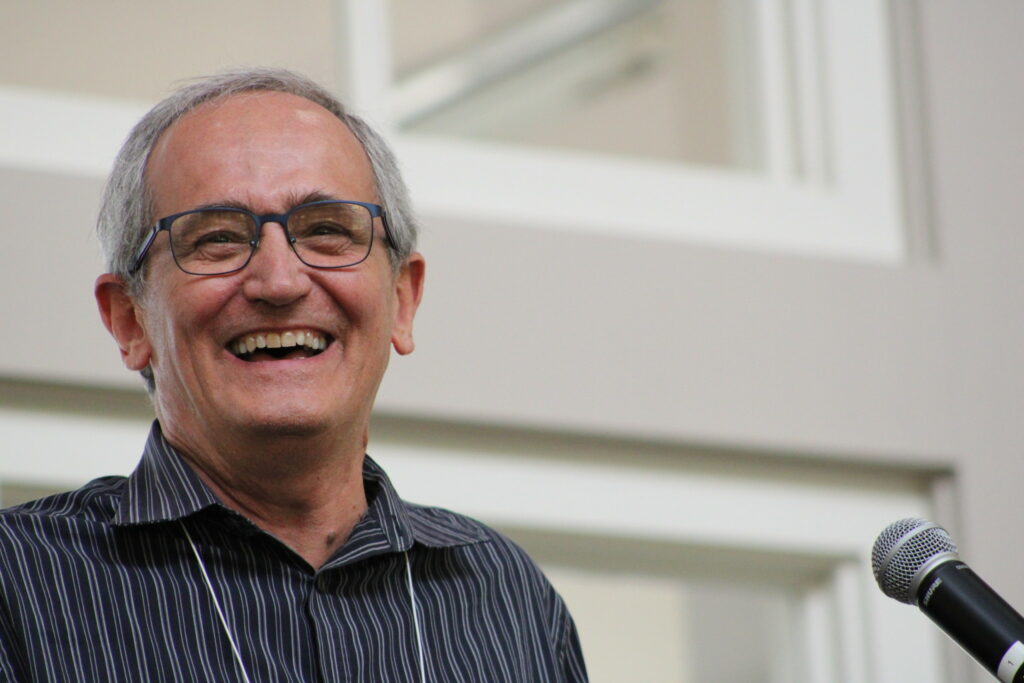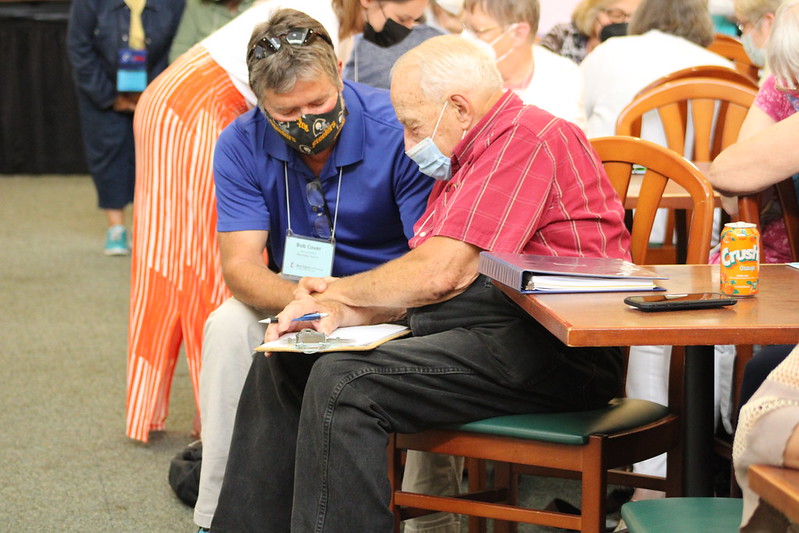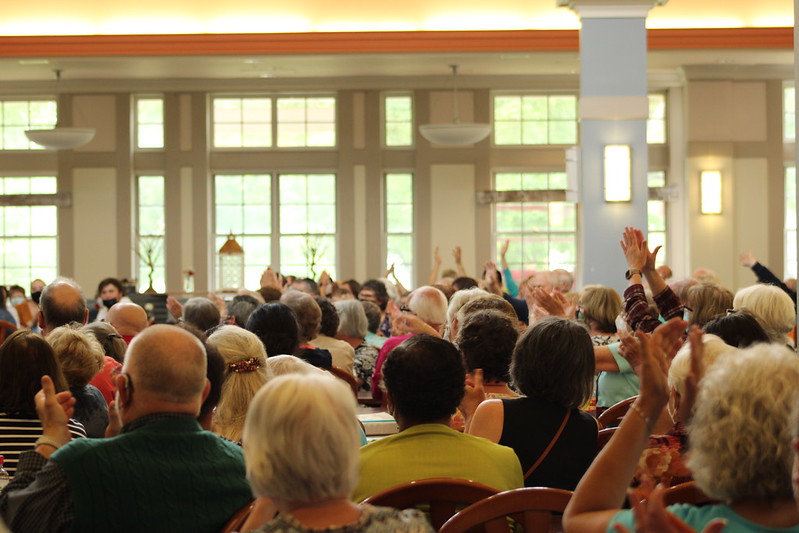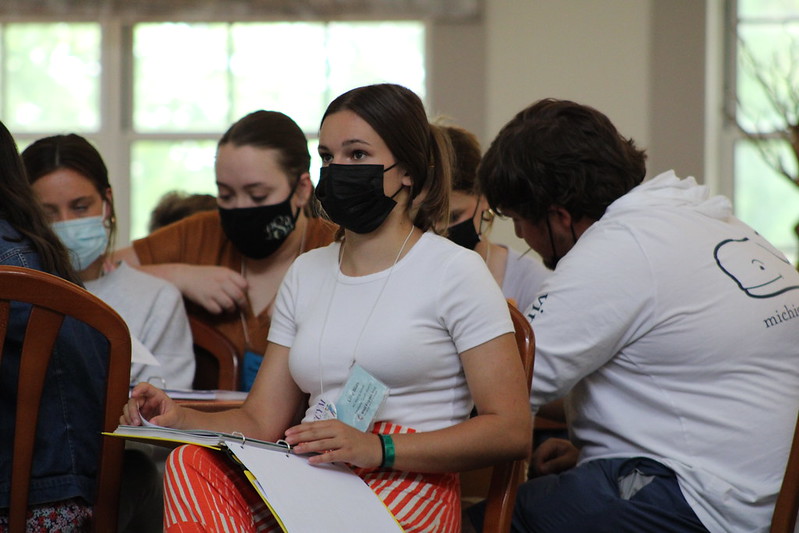John Wesley’s three simple rules are good words to live by, but the four words that keynote speaker George Howard jotted down on his ride to Buckhannon from the Charleston airport might make living by those three simple rules easier.
Humility. Curiosity. Intentionality. And lifelong-learner.
Howard, a lay person from the West Ohio Conference currently living in Atlanta, shared those words during a laity gathering at Annual Conference Friday on the campus of West Virginia Wesleyan College.

“Relationships are what matter the most,” Howard said before explaining the importance of those four words in living with and loving people who don’t think the way you think.
“Humility. … If I want to enter into a relationship with my neighbor, then I need to approach them in a posture of humility. … Curiosity. … I need to be curious about them. I need to know, what do they like to do? … Intentionality. … I knew what I wanted out of the conversation, and it wasn’t about me.”
As for “lifelong-learner,” Howard spoke of his own experience coming into a laity position as a progressive who had to work alongside people who thought differently than he did. “Over time we taught each other a lot of things. I am a lifelong learner. I don’t know what God wants to teach me next, but I know that there’s more.”
Throughout the gathering, Howard interacted with the crowd, encouraging them to have conversations with their neighbors



“I’ve lived in places where there are significant numbers of people who don’t think the way I think,” Howard said, noting that not only has he visited places where people don’t even speak his language, but his own family members disagree on issues like politics and abortion. “It’s the kind of world we live in.”
Howard emphasized the importance of communication and building relationships with all neighbors regardless of differences. In fact, he asked the audience to give it a try with a simple greeting to another person.
“How hard was that? It wasn’t hard at all,” he said afterwards. “It was hard to get you to stop (talking). We do it all the time. It’s not hard. We make it hard. We make it more complicated than it needs to be.”
Then he asked the audience to discuss something more difficult — how they could pray for one another.
“I don’t think Jesus ever told us it was going to be easy out there,” Howard said. “But coming together will make it easier to be the people that God wants us to be.”
And those people are people who are called to make connections.
“The challenge as Christians is if we go in saying that we are right and they are wrong, we are never going to make that connection with them,” Howard said.
“Some of our conversations really are that easy,” he said, referring to the initial greeting conversation. “Some are difficult. Some are really more difficult.”
Howard encouraged participants to consider harder, controversial issues and practice having intentional conversations with the goal of learning from one another. “As we practice, we get better at it.”
And that, he noted, will help us to build bridges and show love.
Comments from participants inspired an impromptu singing of “And They’ll Know We Are Christians by Our Love.”
“When you are at work, at school, do you take the time … to be a Christian and to do that and to build those bridges?” Howard asked. “It’s that simple to start with, and then it gets harder.
“Some of Jesus’ friends are easier for me to love than others,” he admitted. “But he brought them not just into my life, he brought them into my heart and he challenged me to love my neighbor as I love myself. … I’ve looked at that passage multiple times, and I cannot find an escape clause. How do I love people who think differently than I do, who believe differently than I do?”
To help him address the answer, Howard played a video of an interview he conducted with Bishop Gabriel Yemba Unda of the Congo Central Conference, where they are rural, isolated, and despite conflict between Pygmies and Bantus, “are doing something right,” Howard said.
We are meant to live with our differences,” the bishop said, pointing out his belief that Paul and Peter may have disagreed yet respected each other. “ … Let us accept to live with our differences. That acceptance … is key to strengthening and building relationships.”
“Keep the faith and keep the hope,” the Congo bishop advised. “We may be going through some kind of turbulence, but I say fasten your seatbelt, because we are about to land. Do not give up. Do not quench the spirit.”
Howard said that the same bishop once told him that the difference between evangelism in the Congo and evangelism here is “We know our neighbors, and you don’t.”
“It was his words that I heard when I moved into my new condo and got to know the names of my neighbors and their dogs,” Howard said.
“The relationship with you is more important than my being right,” Howard said. “If I insist on being right, I’ve closed off any possibility that I might grow or that you might grow.”